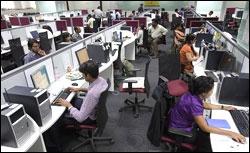Dynamic of IT, religion will create a new industry, generating software and service opportunities, Priyanka Joshi.
Religion-driven IT is estimated to generate more than $40 billion in software and service opportunities by 2017, according to Gartner analysts. "Religion has a great influence on high-growth regions such as Latin America, Africa, the Arab world and South Asia, thus compelling new entrants and incumbent IT providers to seek new opportunities with religious entities," said Asheesh Raina, principal research analyst at Gartner.
 "Direct IT spending by religious groups is small compared with the influence of religion on the IT spending of other industries and enterprises."
"Direct IT spending by religious groups is small compared with the influence of religion on the IT spending of other industries and enterprises."
The dynamic of IT and religion will create a new industry, generating software and service opportunities. The convergence of religion and IT will present novel ways of doing business and unconventional opportunities for IT entrepreneurs and innovators over an extended period of time.
"Religion-based banking, equity trading, mutual funds, financial services and so forth (including Islamic banking, takaful insurance and the Dharma Global Index) require new applications, products and heavy software customization, thus creating a role for religion domain experts.
The number of people visiting religious places (such as temples and shrines during hajj and other religious pilgrimages/tours) is growing and hence increasing the need for religious bodies to attain automation through IT to provide safe, secure and faster religious services," said Raina.
Religion-driven IT is becoming a crucial test model for IT providers to gain a larger presence in Saudi Arabia, South Africa, Poland, Turkey and Argentina (all with high religiosity) in the next 5 years. "In the next four to five years, religion slowly but steadily will continue to drive and change the way IT is consumed today by generating a significant amount, and variety of, new IT opportunities and business models.
A lack of standardization and nonavailability of skilled resources in this space will require IT to play a critical role, albeit while treading carefully," noted Raina.










